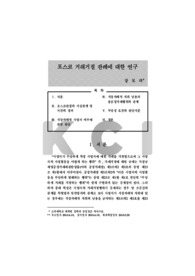

PARTNER
검증된 파트너 제휴사 자료
포스코 거래거절 판례에 대한 연구 (A Study on the Posco's Unilateral Refusal to Deal)
한국학술지에서 제공하는 국내 최고 수준의 학술 데이터베이스를 통해 다양한 논문과 학술지 정보를 만나보세요.
38 페이지
최초등록일 2025.07.12
최종저작일
2010.05

-
미리보기
서지정보
· 발행기관 : 안암법학회
· 수록지 정보 : 안암법학 / 32호 / 237 ~ 274페이지
· 저자명 : 강보라
초록
Posco is a monopolistic supplier in the domestic hot rolled steel coil market. Hysco Co. Ltd — Posco’s competitor in the cold rolled steel sheet market — requested Posco to provide it with hot rolled steel coils, an essential material in producing cold rolled steel sheets. Posco declined the request. The KFTC found Posco’s refusal to supply Hysco Co. Ltd with hot rolled steel coil as constituting an obstruction of the competitor’s business activities that undermines competition in the market. In the end, the KFTC imposed corrective measures and a penalty surcharge on Posco. The Seoul High Court confirmed the KFTC’s decision. However, the Supreme Court quashed the decision, citing that regardless of Posco’s refusal to provide hot rolled steel coils, Hysco could produce cold rolled steel sheets by importing hot rolled steel coils from Japan. Furthermore, the court took note of the fact that Hysco earned a good profit, and therefore, there was no competition-restricting effect and no intent to restrict competition or eliminate competitors.
This case has great significance that the Supreme Court clarified the criterion for the illegality of the dominant firm's refusal to deal for the first time. The court held that the effect of restriction on the competition should be considered in determining whether the dominant firm's refusal to deal constitutes the violation of the antitrust law. The court stated that refusal to deal is not presumed to be illegal just because the firm has dominant position. Therefore in order to prohibit the dominant firm's conduct, the KFTC should establish not only that the company is in a market dominant position in having a market share exceeding a certain percentage(50% or more), but also that the alleged refusal to deal causes anti-competitive effect.
Under the principle of freedom of contracts, the refusal itself is not in violation of the antitrust law. Only the 'unreasonable' refusals are regarded as violating the MRFTA. However, there has been debates over what the 'unreasonable' refusal means. The court declared that it is not sufficient to determine abuse of a market power on the bases that a specific competitor has some difficulties to manage its business activities or suffers from disadvantages because of the refusal. The court stated that when distinguishing abuses of dominant power from unfair practices, the former would require anti-competitiveness while simple unfairness of means would be enough for the latter. Therefore, to satisfy the 'unreasonable' requirement in determining abuse of a dominant position, the KFTC should prove anti-competitive effects that include price increase, output reduction, hampering innovation, eliminating important competitors etc.
The decision, however, has some problems. The court said that the KFTC should prove the specific 'intent' to monopolize and restrict competition. This is incompatible with the Korea antitrust law since we have no provision which stipulates 'intent'. Even in the U.S., the motherland of intent requirement, the intent to restrict competition can be presumed only if dominant firm's conduct causes anti-competitive effect today. Therefore, this should be reconsidered in the following cases.
In addition, there are some problems regarding the definition of the relevant market. It is favorable that supply substitution as well as demand substitution should be considered in defining the relevant product market. Regarding geographical market, however, while the court admitted the possibility of foreign inflows, it limited the relevant market to the domestic area and did not expand the market to the international market. It deserves criticism.영어초록
Posco is a monopolistic supplier in the domestic hot rolled steel coil market. Hysco Co. Ltd — Posco’s competitor in the cold rolled steel sheet market — requested Posco to provide it with hot rolled steel coils, an essential material in producing cold rolled steel sheets. Posco declined the request. The KFTC found Posco’s refusal to supply Hysco Co. Ltd with hot rolled steel coil as constituting an obstruction of the competitor’s business activities that undermines competition in the market. In the end, the KFTC imposed corrective measures and a penalty surcharge on Posco. The Seoul High Court confirmed the KFTC’s decision. However, the Supreme Court quashed the decision, citing that regardless of Posco’s refusal to provide hot rolled steel coils, Hysco could produce cold rolled steel sheets by importing hot rolled steel coils from Japan. Furthermore, the court took note of the fact that Hysco earned a good profit, and therefore, there was no competition-restricting effect and no intent to restrict competition or eliminate competitors.
This case has great significance that the Supreme Court clarified the criterion for the illegality of the dominant firm's refusal to deal for the first time. The court held that the effect of restriction on the competition should be considered in determining whether the dominant firm's refusal to deal constitutes the violation of the antitrust law. The court stated that refusal to deal is not presumed to be illegal just because the firm has dominant position. Therefore in order to prohibit the dominant firm's conduct, the KFTC should establish not only that the company is in a market dominant position in having a market share exceeding a certain percentage(50% or more), but also that the alleged refusal to deal causes anti-competitive effect.
Under the principle of freedom of contracts, the refusal itself is not in violation of the antitrust law. Only the 'unreasonable' refusals are regarded as violating the MRFTA. However, there has been debates over what the 'unreasonable' refusal means. The court declared that it is not sufficient to determine abuse of a market power on the bases that a specific competitor has some difficulties to manage its business activities or suffers from disadvantages because of the refusal. The court stated that when distinguishing abuses of dominant power from unfair practices, the former would require anti-competitiveness while simple unfairness of means would be enough for the latter. Therefore, to satisfy the 'unreasonable' requirement in determining abuse of a dominant position, the KFTC should prove anti-competitive effects that include price increase, output reduction, hampering innovation, eliminating important competitors etc.
The decision, however, has some problems. The court said that the KFTC should prove the specific 'intent' to monopolize and restrict competition. This is incompatible with the Korea antitrust law since we have no provision which stipulates 'intent'. Even in the U.S., the motherland of intent requirement, the intent to restrict competition can be presumed only if dominant firm's conduct causes anti-competitive effect today. Therefore, this should be reconsidered in the following cases.
In addition, there are some problems regarding the definition of the relevant market. It is favorable that supply substitution as well as demand substitution should be considered in defining the relevant product market. Regarding geographical market, however, while the court admitted the possibility of foreign inflows, it limited the relevant market to the domestic area and did not expand the market to the international market. It deserves criticism.참고자료
· 없음태그
- # Posco Case
- # refusal to deal
- # criterion for the illegality
- # intent to restrict com- petition
- # abuse of a dominant position
- # unfair business practices
- # Definition of the Relevant Market
- # competition-restricting effects
- # 포스코 판결
- # 거래거절
- # 부당성 판단기준
- # 경쟁제한적 의도
- # 시장지배적 지위 남용
- # 불공정거래행위
- # 관련시장의 획정
- # 경쟁제한적 효과
-
자주묻는질문의 답변을 확인해 주세요

꼭 알아주세요
-
자료의 정보 및 내용의 진실성에 대하여 해피캠퍼스는 보증하지 않으며, 해당 정보 및 게시물 저작권과 기타 법적 책임은 자료 등록자에게 있습니다.
자료 및 게시물 내용의 불법적 이용, 무단 전재∙배포는 금지되어 있습니다.
저작권침해, 명예훼손 등 분쟁 요소 발견 시 고객센터의 저작권침해 신고센터를 이용해 주시기 바랍니다. -
해피캠퍼스는 구매자와 판매자 모두가 만족하는 서비스가 되도록 노력하고 있으며, 아래의 4가지 자료환불 조건을 꼭 확인해주시기 바랍니다.
파일오류 중복자료 저작권 없음 설명과 실제 내용 불일치 파일의 다운로드가 제대로 되지 않거나 파일형식에 맞는 프로그램으로 정상 작동하지 않는 경우 다른 자료와 70% 이상 내용이 일치하는 경우 (중복임을 확인할 수 있는 근거 필요함) 인터넷의 다른 사이트, 연구기관, 학교, 서적 등의 자료를 도용한 경우 자료의 설명과 실제 자료의 내용이 일치하지 않는 경우
“안암법학”의 다른 논문도 확인해 보세요!
-
‘브라질-재생 타이어 수입에 영향을 주는 조치’사건 - GATT1994 XX조의 적용을 중심으로 - 29 페이지
‘Brazil-Measures Affecting Imports of Retreaded Tyres’ (hereinafter ‘Brazil-Tyres case') is the first WTO dispute complained by a developed countries (EC) addressing a trade-restrictive measure introd.. -
자기신탁에 관한 고찰 - 『신탁법』개정안을 중심으로 - 36 페이지
Under the reform bill for Korean Trust Act, it permits that the owner of property declares that he/she holds his/her identifiable property as a trustee. It is called "declaration of trust". We call th.. -
모자보건법 제14조: 개정 필요성과 방향 30 페이지
Many years ago abortion was recognised an individual right by the U.S. Supreme Court. Today it is a public institution. As the Supreme Court observed in the 1992 Casey decision, which reaffirmed Roe v..
찾으시던 자료가 아닌가요?
지금 보는 자료와 연관되어 있어요!
문서 초안을 생성해주는 EasyAI


